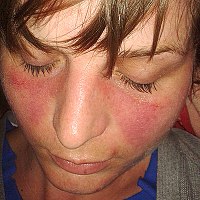
Photo from wikipedia
OBJECTIVES Macrophage activation syndrome (MAS) is a life-threatening hyperinflammatory syndrome that can occur during systemic lupus erythematosus (SLE). Data on MAS in adult SLE patients are very limited. The aim… Click to show full abstract
OBJECTIVES Macrophage activation syndrome (MAS) is a life-threatening hyperinflammatory syndrome that can occur during systemic lupus erythematosus (SLE). Data on MAS in adult SLE patients are very limited. The aim of this study is to describe the clinical characteristics, laboratory findings, treatments, and outcomes of a large series of SLE-associated MAS. METHODS We conducted a retrospective study that included 103 episodes of MAS in 89 adult patients with SLE. RESULTS 103 episodes in 89 adult patients were analyzed. Median age at first MAS episode was 32 (18-80) years. MAS was inaugural in 41 patients (46%).Thirteen patients relapsed. Patients had the following features: fever (100% episodes), increased serum levels of AST (94.7%), LDH (92.3%), CRP (84.5%), ferritin (96%), procalcitonin (41/49 cases). Complications included myocarditis (n=22), acute lung injury (n=15) and seizures (n=11). In 33 episodes, patients required hospitalization in an ICU and 5 died. Thrombocytopenia and high CRP levels were associated independently with an increased risk for ICU admission. High dose steroids alone as first line therapy induced remission in 37/57 cases (65%). Additional medications as first or second line therapies included IV immunoglobulins (n=22), cyclophosphamide (n=23), etoposide (n=11), rituximab (n=3). Etoposide and cyclophosphamide-based regimens had the best efficacy. CONCLUSION MAS is a severe complication and is often inaugural. High fever and high levels of AST, LDH, CRP, ferritin and PCT should be considered as red flags for early diagnosis. High dose steroids lead to remission in two third of cases. Cyclophosphamide or etoposide should be considered for uncontrolled/severe forms.
Journal Title: Autoimmunity reviews
Year Published: 2017
Link to full text (if available)
Share on Social Media: Sign Up to like & get
recommendations!